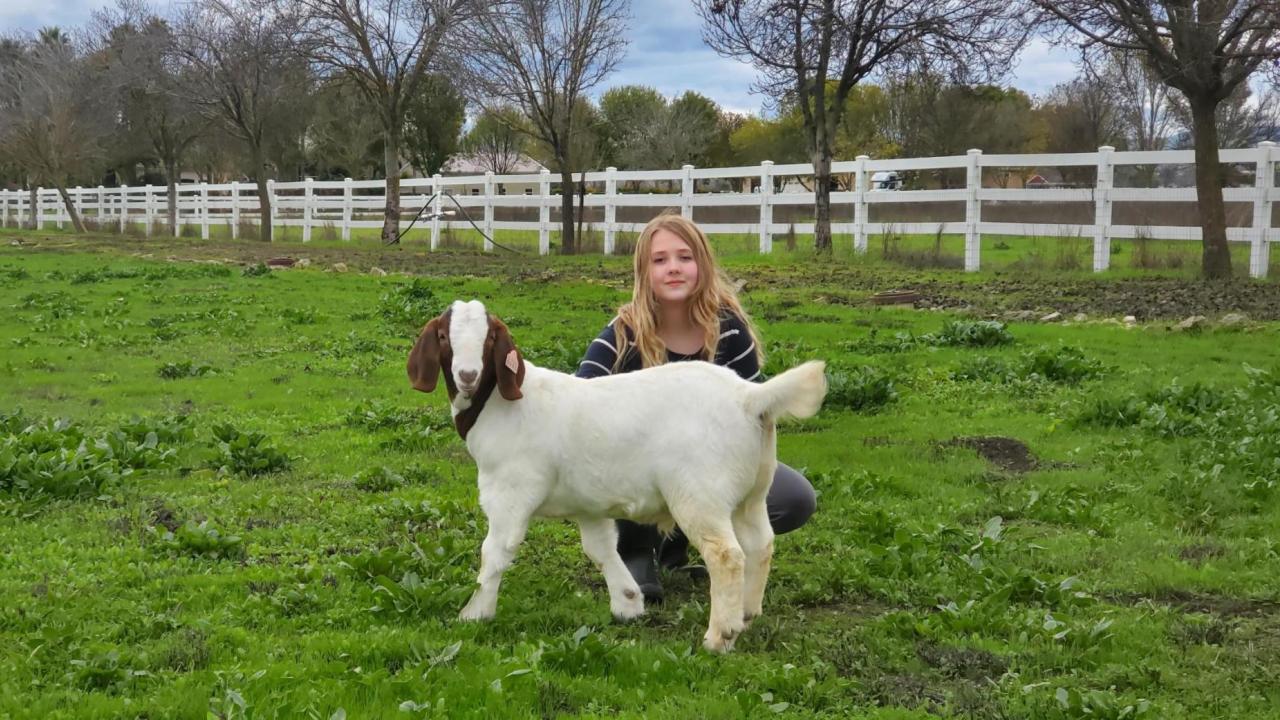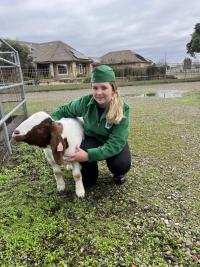
Goat Successfully Treated for Urinary Blockage
“Case of the Month” – January 2024
Aria Brecheisen, 13, was exercising her 4-H goat Captain America (Cap) when she witnessed him drop to the ground and vocalize in pain. Cap, a 6-month-old Boer goat, continued to lay down straining in pain every few steps as she tried to walk him back to the barn. The family noticed Cap couldn’t urinate, and was lethargic with a decreased appetite, so they took him to the UC Davis veterinary hospital’s Large Animal Clinic.

Dr. Munashe Chigerwe, chief of the Livestock Medicine and Surgery Service, and resident Dr. Florence Dupuis-Dowd took the lead on the case. The service performed a physical examination on Cap and additional testing including bloodwork, X-rays, and an ultrasound. These tests helped confirm that he had a urinary obstruction due to bladder stones, and systemic compromise including electrolyte changes and increased kidney values consistent with not being able to urinate.
“Urinary obstructions are extremely common in small ruminants, especially wethers (castrated sheep and goats) like Cap, because their urethra is narrower than intact males or females,” said Dr. Sarah Depenbrock, an assistant professor of livestock medicine. “We also manage urinary obstructions in other livestock species including cattle and pigs.”
Cap was treated urgently to stabilize him and provide urinary diversion (a way for urine to flow out of the body). The team placed a tube through his skin and abdomen into his bladder to allow temporary urinary drainage. They also surgically amputated his urethral process (small, narrow appendage at the end of the penis where stones often lodge), allowing for a larger urethral opening.
The diagnostic tests results were consistent with struvite type stones, which can sometimes be dissolved with medical treatment. Cap was given IV fluids, muscle relaxants, pain medication, and urinary acidification to dissolve the stones, and antibiotics to prevent infection of the bladder. Fortunately, this process cleared his stones, and he was able to urinate normally once again. Repeated bloodwork showed that his condition improved greatly, and he was discharged after three days of medical management by members of the service, including veterinarians, veterinary students, and veterinary technicians specifically trained in the care of livestock.

Aria is in her third year of raising animals through the Brentwood Chapter of 4-H. She is preparing Cap to compete in the “market goat” and “showmanship” categories at the 2024 Contra Costa County Fair in May. In addition to Cap, Aria will also show chickens and her dog. In the two previous years of showing other animals, she won 2nd place and 1st place in the “market goat” category at the fair.
Cap is expected to be fully healed and ready for the fair by May.
“I really enjoy participating in 4-H,” Aria said. “We learn the responsibility of caring for an animal and how to identify the best build of the goat when looking to buy your 4-H animal. I could tell by Cap’s baby pictures that he was going to be a good goat. Now it’s just a matter of working up his back and front ends.”
To accomplish that, Aria performs many exercises with Cap, including working him out on a treadmill. She hopes Cap has what it takes to be Grand Champion this year.
Dr. Depenbrock advises other goat owners that water intake and weather changes can influence the likelihood of urinary obstructions, so pay close attention to them as it gets colder in winter and in the summer heat. Other changes to watch for include:
- Changes in posture, vocalizing, and/or failing to produce urine (or dribbling) while attempting to urinate; Changes in attitude or appetite
- Grinding teeth
- Laying down more frequently
“Since urinary obstructions are very common in wethers, any sign of illness in a wether may be sign of urinary obstruction,” said Dr. Depenbrock. “If you see any of these signs, consult a veterinarian right away. If left untreated, urinary obstructions are fatal.”
Ways to prevent urinary obstruction include:
- Castrate sheep and goats later in life, if feasible, to allow more urethral growth
- Provide multiple sources of fresh, clean, palatable water under shelter
- Provide a mineral or salt lick (appropriate for the specific species) to encourage drinking water
- Limit high risk feeds. Certain feeds can predispose animals to different types of stones. Grain predisposes them to struvite type stones (gritty, sandy stones), and alfalfa predisposes them to calcium carbonate type stones (hard stones that look like metal BBs).
Treatments with the Livestock Medicine and Surgery Service can be obtained with or without a referral from your farm veterinarian. Contact the Large Animal Clinic at 530-752-0290 for more information.
# # #
